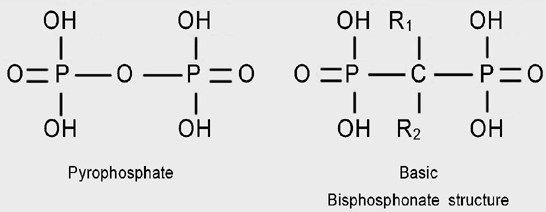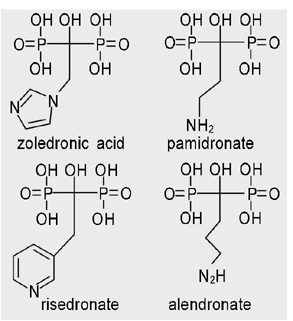J Korean Acad Periodontol.
2009 Mar;39(1):1-8. 10.5051/jkape.2009.39.1.1.
Mechanism, prevention, risk assessment and treatment in bisphosphonates induced osteonecrosis of the jaw
- Affiliations
-
- 1Department of Periodontology, Research institute of periodontal regeneration, College of Dentistry, Yonsei University, Korea. shchoi726@yuhc.ac
- KMID: 1783510
- DOI: http://doi.org/10.5051/jkape.2009.39.1.1
Abstract
-
PURPOSE: Bisphophonates are drugs used to suppress osteoclastic activity and to treat osteoporosis, Paget's disease of bone and bone metastasis. The purpose of this report is to review the literatures on bisphopsphonates use that could affect bone healing and cause osteonecrosis of the jaws.
MATERIALS AND METHODS
Medline research was carried out to find relevant articles on bisphophonates and osteonecrosis of the jaw.
RESULTS
Oral administration of bisphopsphonates is reported to decrease the risk of adverse bone outcomes. On the contrary, IV bisphopsphonates is known to significantly increase the risk. Prevention of the osteonecrosis of the jaw is primary concern before usage. If the adverse bone reaction takes place, proper management and treatments are required to alleviate pain of patients and prevent further progression of necrosis.
CONCLUSION
Case reports of bisphosphonates induced osteonecrosis of the jaw are increasing. Dentists and physicians should be aware of the higher frequency of osteonecrosis of the jaw in patients receiving IV bisphopsphonates and be prepared to prevent and cope with adverse bone reaction.
MeSH Terms
-
Administration, Oral
Dentists
Diphosphonates
Humans
Hypogonadism
Jaw
Mitochondrial Diseases
Necrosis
Neoplasm Metastasis
Ophthalmoplegia
Osteitis Deformans
Osteoclasts
Osteonecrosis
Osteoporosis
Phosphatidylethanolamines
Risk Assessment
Diphosphonates
Hypogonadism
Mitochondrial Diseases
Ophthalmoplegia
Phosphatidylethanolamines
Figure
Reference
-
1. Epstein S. Update of current therapeutic options for the treatment of postmenopausal osteoporosis. Clin Ther. 2006. 28:151–173.
Article2. Badros A, Weikel D, Salama A, et al. Osteonecrosis of the jaw in multiple myeloma patients: clinical features and risk factors. J Clin Oncol. 2006. 24:945–952.
Article3. Ruggiero SL, Mehrotra B, Rosenberg TJ, Engroff SL. Osteonecrosis of the jaws associated with the use of bisphosphonates: a review of 63 cases. J Oral Maxillofac Surg. 2004. 62:527–534.
Article4. Berenson JR, Hillner BE, Kyle RA, et al. American Society of Clinical Oncology clinical practice guidelines: the role of bisphosphonates in multiple myeloma. J Clin Oncol. 2002. 20:3719–3736.
Article5. Owens G, Jackson R, Lewiecki EM. An integrated approach: bisphosphonate management for the treatment of osteoporosis. Am J Manag Care. 2007. 13:Suppl 11. S290–S308. quiz S309-312.6. Brooks JK, Gilson AJ, Sindler AJ, et al. Osteonecrosis of the jaws associated with use of risedronate: report of 2 new cases. Oral Surg Oral Med Oral Pathol Oral Radiol Endod. 2007. 103:780–786.
Article7. Wynn RL. Oral bisphosphonates and osteonecrosis of the jaw. Gen Dent. 2007. 55:8–10.8. Marx RE. Pamidronate(Aredia) and zoledronate(Zometa) induced avascular necrosis of the jaws: a growing epidemic. J Oral Maxillofac Surg. 2003. 61:1115–1117.
Article9. Migliorati CA. Bisphosphanates and oral cavity avascular bone necrosis. J Clin Oncol. 2003. 21:4253–4254.
Article10. Khosla S, Burr D, Cauley J, et al. Bisphosphonate-associated osteonecrosis of the jaw: report of a task force of the American Society for Bone and Mineral Research. J Bone Miner Res. 2007. 22:1479–1491.
Article11. Bamias A, Kastritis E, Bamia C, et al. Osteonecrosis of the jaw in cancer after treatment with bisphosphonates: incidence and risk factors. J Clin Oncol. 2005. 23:8580–8587.
Article12. Grbic JT, Landesberg R, Lin SQ, et al. Incidence of osteonecrosis of the jaw in women with postmenopausal osteoporosis in the health outcomes and reduced incidence with zoledronic acid once yearly pivotal fracture trial. J Am Dent Assoc. 2008. 139:32–40.
Article13. Bilezikian JP. Osteonecrosis of the jaw--do bisphosphonates pose a risk? N Engl J Med. 2006. 355:2278–2281.
Article14. Boonyapakorn T, Schirmer I, Reichart PA, et al. Bisphosphonate-induced osteonecrosis of the jaws: prospective study of 80 patients with multiple myeloma and other malignancies. Oral Oncol. 2008. 44:857–869.
Article15. Mavrokokki T, Cheng A, Stein B, Goss A. Nature and frequency of bisphosphonate-associated osteonecrosis of the jaws in Australia. J Oral Maxillofac Surg. 2007. 65:415–423.
Article16. Black DM, Delmas PD, Eastell R, et al. Once-yearly zoledronic acid for treatment of postmenopausal osteoporosis. N Engl J Med. 2007. 356:1809–1822.
Article17. Etminan M, Aminzadeh K, Matthew IR, Brophy JM. Use of oral bisphosphonates and the risk of aseptic osteonecrosis: a nested case-control study. J Rheumatol. 2008. 35:691–695.18. Cartsos VM, Zhu S, Zavras AI. Bisphosphonate use and the risk of adverse jaw outcomes: a medical claims study of 714,217 people. J Am Dent Assoc. 2008. 139:23–30.19. Edwards BJ, Hellstein JW, Jacobsen PL, et al. Updated recommendations for managing the care of patients receiving oral bisphosphonate therapy: an advisory statement from the American Dental Association Council on Scientific Affairs. J Am Dent Assoc. 2008. 139:1674–1677.
Article20. Sedghizadeh PP, Stanley K, Caligiuri M, et al. Oral bisphosphonate use and the prevalence of osteonecrosis of the jaw: an institutional inquiry. J Am Dent Assoc. 2009. 140:61–66.21. Fleisch H, Russell RG, Straumann F. Effect of pyrophosphate on hydroxyapatite and its implications in calcium homeostasis. Nature. 1966. 212:901–903.
Article22. Fleisch H. Development of bisphosphonates. Breast Cancer Res. 2002. 4:30–34.23. Green JR. Bisphosphonates: preclinical review. Oncologist. 2004. 9:Suppl 4. 3–13.
Article24. American Association of Oral and Maxillofacial Surgeons position paper on bisphosphonate-related osteonecrosis of the jaws. J Oral Maxillofac Sur. 2007. 65:369–376.25. Rogers MJ, Gordon S, Benford HL, et al. Cellular and molecular mechanisms of action of bisphosphonates. Cancer. 2000. 88:2961–2978.
Article26. Benford HL, Frith JC, Auriola S, et al. Farnesol and geranylgeraniol prevent activation of caspases by aminobisphosphonates: biochemical evidence for two distinct pharmacological classes of bisphosphonate drugs. Mol Pharmacol. 1999. 56:131–140.
Article27. Bergstrom JD, Bostedor RG, Masarachia PJ, et al. Alendronate is a specific, nanomolar inhibitor of farnesyl diphosphate synthase. Arch Biochem Biophys. 2000. 373:231–241.
Article28. Lehenkari PP, Kellinsalmi M, Napankangas JP, et al. Further insight into mechanism of action of clodronate: inhibition of mitochondrial ADP/ATP translocase by a nonhydrolyzable, adenine-containing metabolite. Mol Pharmacol. 2002. 61:1255–1262.
Article29. McClung MR. Bisphosphonates. Endocrinol Metab Clin North Am. 2003. 32:253–271.
Article30. Alakangas A, Selander K, Mulari M, et al. Alendronate disturbs vesicular trafficking in osteoclasts. Calcif Tissue Int. 2002. 70:40–47.
Article31. Dixon R, Tricker N, Garetto L. Bone turnover in elderly canine mandibles and tibia. J Dent Res 76(IADR Abstracts). 1997. 2579.32. Vignery A, Baron R. Dynamic histomorphometry of alveolar bone remodeling in the adult rat. Anat Rec. 1980. 196:191–200.
Article33. Brunski JB. In vivo bone response to biomechanical loading at the bone/dental-implant interface. Adv Dent Res. 1999. 13:99–119.
Article34. Fournier P, Boissier S, Filleur S, et al. Bisphosphonates inhibit angiogenesis in vitro and testosterone-stimulated vascular regrowth in the ventral prostate in castrated rats. Cancer Res. 2002. 62:6538–6544.35. Reid IR, Bolland MJ, Grey AB. Is bisphosphonate-associated osteonecrosis of the jaw caused by soft tissue toxicity? Bone. 2007. 41:318–320.
Article36. Sawatari Y, Marx RE. Bisphosphonates and bisphosphonate induced osteonecrosis. Oral Maxillofac Surg Clin North Am. 2007. 19:487–498. v–vi.
Article37. Hansen T, Kunkel M, Weber A, James Kirkpatrick C. Osteonecrosis of the jaws in patients treated with bisphosphonates - histomorphologic analysis in comparison with infected osteoradionecrosis. J Oral Pathol Med. 2006. 35:155–160.
Article38. Walter C, Grotz KA, Kunkel M, Al-Nawas B. Prevalence of bisphosphonate associated osteonecrosis of the jaw within the field of osteonecrosis. Support Care Cancer. 2007. 15:197–202.
Article39. Ficarra G, Beninati F, Rubino I, et al. Osteonecrosis of the jaws in periodontal patients with a history of bisphosphonates treatment. J Clin Periodontol. 2005. 32:1123–1128.
Article40. Marx RE, Sawatari Y, Fortin M, Broumand V. Bisphosphonate-induced exposed bone (osteonecrosis/osteopetrosis) of the jaws: risk factors, recognition, prevention, and treatment. J Oral Maxillofac Surg. 2005. 63:1567–1575.
Article41. Bagan JV, Jimenez Y, Murillo J, et al. Jaw osteonecrosis associated with bisphosphonates: multiple exposed areas and its relationship to teeth extractions. Study of 20 cases. Oral Oncol. 2006. 42:327–329.
Article42. Marx RE, Cillo JE Jr.. , Ulloa JJ. Oral bisphosphonate-induced osteonecrosis: risk factors, prediction of risk using serum CTX testing, prevention, and treatment. J Oral Maxillofac Surg. 2007. 65:2397–2410.
Article43. Friberg B, Ekestubbe A, Mellstrom D, Sennerby L. Branemark implants and osteoporosis: a clinical exploratory study. Clin Implant Dent Relat Res. 2001. 3:50–56.44. Rosen HN, Moses AC, Garber J, et al. Serum CTX: a new marker of bone resorption that shows treatment effect more often than other markers because of low coefficient of variability and large changes with bisphosphonate therapy. Calcif Tissue Int. 2000. 66:100–103.
Article45. Schwartz JE. Ask us: Some drugs affect tooth movement. Am J Orthod Dentofacial Orthop. 2005. 127:644.46. Rinchuse DJ, Sosovicka MF, Robison JM, Pendleton R. Orthodontic treatment of patients using bisphosphonates: a report of 2 cases. Am J Orthod Dentofacial Orthop. 2007. 131:321–326.
Article47. Jeffcoat MK. Safety of oral bisphosphonates: controlled studies on alveolar bone. Int J Oral Maxillofac Implants. 2006. 21:349–353.
Article48. Wang HL, Weber D, McCauley LK. Effect of long-term oral bisphosphonates on implant wound healing: literature review and a case report. J Periodontol. 2007. 78:584–594.
Article49. Woo SB, Hellstein JW, Kalmar JR. Narrative [corrected] review: bisphosphonates and osteonecrosis of the jaws. Ann Intern Med. 2006. 144:753–761.
Article50. IMS, HEALTH. NPA Plus May. 2006.
- Full Text Links
- Actions
-
Cited
- CITED
-
- Close
- Share
- Similar articles
-
- Osteonecrosis of the Jaw in Korean Woman with Osteoporosis Treated with Oral Bisphosphonate: Case Report
- Dental implant treatment after healing of bisphosphonate-related osteonecrosis of the jaw (BRONJ) in the same region: a case report
- Review and Update of the Risk Factors and Prevention of Antiresorptive-Related Osteonecrosis of the Jaw
- Bisphosphonate-Related Osteonecrosis in a Patient with Florid Cemento-Osseous Dysplasia
- Osteonecrosis of the Jaw in a Patient with Osteoporosis Treated with Oral Bisphosphonates



